Essay vs Research Paper: Key Disparities
Table of contents
- 1.1 What Is an Essay?
- 1.2 What Is a Research Paper?
- 2.1 Purpose and Objective
- 2.2 Structure and Organization
- 2.3 Length and Depth
- 2.4 Sources and Evidence
- 2.5 Voice and Style
- 2.6 Audience and Presentation
- 3 Essay vs Research Paper: 10 Points of Difference
- 4 What Is the Difference Between Research Paper and Different Types of Papers
- 5 Let’s Sum Up
Every student needs to write some academic papers for the university. However, even young people with experience can't determine the difference between an essay and a research paper. Although these two areas of academic writing have many similarities, the requirements are still significantly different.
- In this article, you will get a clear definition of an essay and research paper.
- We will outline the key differences between these two types of academic writing.
- You will learn more about the organization, structure, essay and research paper requirements.
- Finally, you will be able to tell the difference between a research paper and an essay.
To get to the heart of the matter of these two academic assignments, we should start by getting an essay vs research paper definition.

Definition and Overview
What is an essay.
An essay is a short piece of work, the purpose of which is to present individual thoughts regarding a chosen topic. Often, essays do not pretend to be scientific but require a defined structure. The basic requirements for an essay suggest writing a five-paragraph piece that contains an introduction, a body, and a conclusion.
What makes your essay unique is your creativity and the novelty of your ideas. To easily structure your thoughts and present them clearly to the reader, you should devote time to drafting an essay . Before you start writing your essay, brainstorm the freshest ideas. Thus, even though all your classmates will use the same five-paragraph structure as you, your ideas will impress the teacher. Experiment with meaning, not form.
What Is a Research Paper?
The difference between an essay and a research paper revolves around the academic approaches. Research work is the depth of study of a selected scientific topic, which should bring scientific novelty by drawing conclusions based on existing research and experiments conducted. For students, it’s not enough to state the facts or express their point of view regarding the topic. Your task is to comprehensively study the subject of research, familiarize yourself with existing opinions, and outline the direction of the upcoming study.
Your teacher will expect you to demonstrate analytical skills, the ability to select reliable sources, and a broad theoretical base on your research topic. Research papers require creativity, erudition, and orientation in the topic.
Key Differences Between Essay and Research Paper
The central difference is the goal of these academic assignments. The essay aims to express an individual point of view and find a creative, fresh approach to an existing topic. A good research paper seeks to introduce scientific novelty by examining existing data and conducting new experiments to analyze the information obtained.
Purpose and Objective
The first and main difference between an essay and a research paper is the purpose of writing . An essay as an academic task has the goal of developing students' creative thinking. It also teaches us a structured presentation of thoughts regarding a certain topic. The student is required to have a non-standard approach, fresh thoughts, and reasoned conclusions on the given topic.
The purpose of the research work is to study a scientific topic in detail. This academic assignment is aimed at assessing the student’s analytical abilities and competence to determine cause-and-effect relationships, filter sources, and formulate logical conclusions. Such work requires theoretical knowledge, preliminary study of existing scientific works, and the ability to formulate goals and research methods.
Moreover, a student is supposed to show the capacity to draw comprehensive conclusions based on available data and information obtained during independent research. This task may seem complicated to students, so they opt for resorting to the help of PapersOwl writing service to save time.
Structure and Organization
To start with, the basic structure of any college essay involves a text consisting of five paragraphs, divided into three main factions: introduction, body part, and conclusion. When students lack time to compose a nicely structured academic essay, they can always pay to write a research paper and have their tasks done by a professional. The introduction presents the topic, sets the main direction for further text, and also works as a bait to motivate the reader to study further work. The introduction is followed by three body paragraphs. Each of the three body paragraphs presents a separate idea.
The last paragraph of any essay is a conclusion. In this paragraph, the college or university student must resume the arguments and ideas presented in the text, summarizing them into the main message of the essay. Often, the idea that you present in your conclusions will be most memorable to the reader.
Consequently, let’s overview the structure of a research paper. Compared to the structure of an essay, the organization of a research paper is much more ornate. This type of work requires a title page and abstract that go before the main body of text. On the title page, the student describes his topic of work, as well as gives contact details. An abstract is a short description of the main ideas and research methods of your work. The research work itself consists of an introduction, background, main part, and conclusions. Also, at the very end, they often add acknowledgments and a list of references, which must be formatted following the required international format.
Length and Depth
The length and depth of analysis between these two academic assignments also differ significantly. As for the essay, it is often a short prose piece whose length does not exceed 1000 words. You are faced with the task of fitting a large array of ideas into a small amount of text. The essay format itself rarely requires rigorous and thorough research of the topic, but you should work on creativity and the presence of a message in your essay. Most academic papers fall in the 300 to 600-word range.
On the other hand, a research paper is a scientific project that includes many theoretical aspects that require analysis and clarification. Thus, the volume is significantly bigger. Basic research paper lengths range from 4,000 to 6,000 words. In this case, you will no doubt have to conduct a comprehensive analysis of the selected sources, formulate a research vector, and spend time conducting your experiments, or ask PapersOwl to do a research paper for you . A research paper is a scientific project that includes many theoretical aspects that require analysis and clarification.
Sources and Evidence
The presence of theoretical sources and references is not a mandatory requirement for an essay. You can state your own thoughts on a given topic without resorting to the help of existing sources. Present your ideas on the topic, giving arguments that seem logical to you. If you do decide to base your paper on existing works, you must be sure to indicate where the information was taken from. And yet, the teacher needs to see your own thoughts rather than a dry listing of existing ideas.
Unlike an essay, a quality research paper must include primary and secondary sources, as well as a specific citation format. Surely, you are not the first person to study this scientific topic. In order not to repeat existing thoughts, you need to conduct a search to form a reliable basis for your study. If you skip this step, you risk basing your paper on misleading scientific findings.
Voice and Style
The very specificity of the essay as an academic paper is the subjective presentation of information. A large percentage of your essay should consist of your perspective and vision of the chosen topic. For this reason, essays often use a less formal and more subjective tone. However, you can still use a large amount of colloquial vocabulary, completely disregarding the norms of formal style. Students often have trouble figuring out the right style for their university assignments. In such cases, a reasonable solution is to seek help from a specialist. When you buy custom-written essays from PapersOwl, you’ll always get a perfectly balanced academic paper.
On the other hand, a research paper is a serious scientific work. The student must maintain a formal tone while complying with all structural requirements. Also, in investigative work, there is little room for subjectivity and a personal approach since an objective style is required. At the same time, do not oversaturate your research work with formalism and standard clichés.
Audience and Presentation
The essay format can be used both in the educational process and in an independent literary style. Therefore, the audience for such a written assignment can be wide and varied. When you’re writing an essay, make sure it’s understandable in academia and for a wide audience.
Research work, on the contrary, is aimed at a range of professionals in the chosen field. Written in scientific language, the goal of this work is to attract the attention of scientists and students of certain majors. Your scientific work should be rich in theory and related terms.
Essay vs Research Paper: 10 Points of Difference
As you may have noticed, research papers and essays have many differences, both global and specific. These two types of academic assignments differ in the purpose of writing, have different structures and formats, and are aimed at testing different skills. And yet, every day, students face difficulties in understanding the basic requirements, which leads to incorrect execution of the task. To summarize the main differences, let's look at the table below.
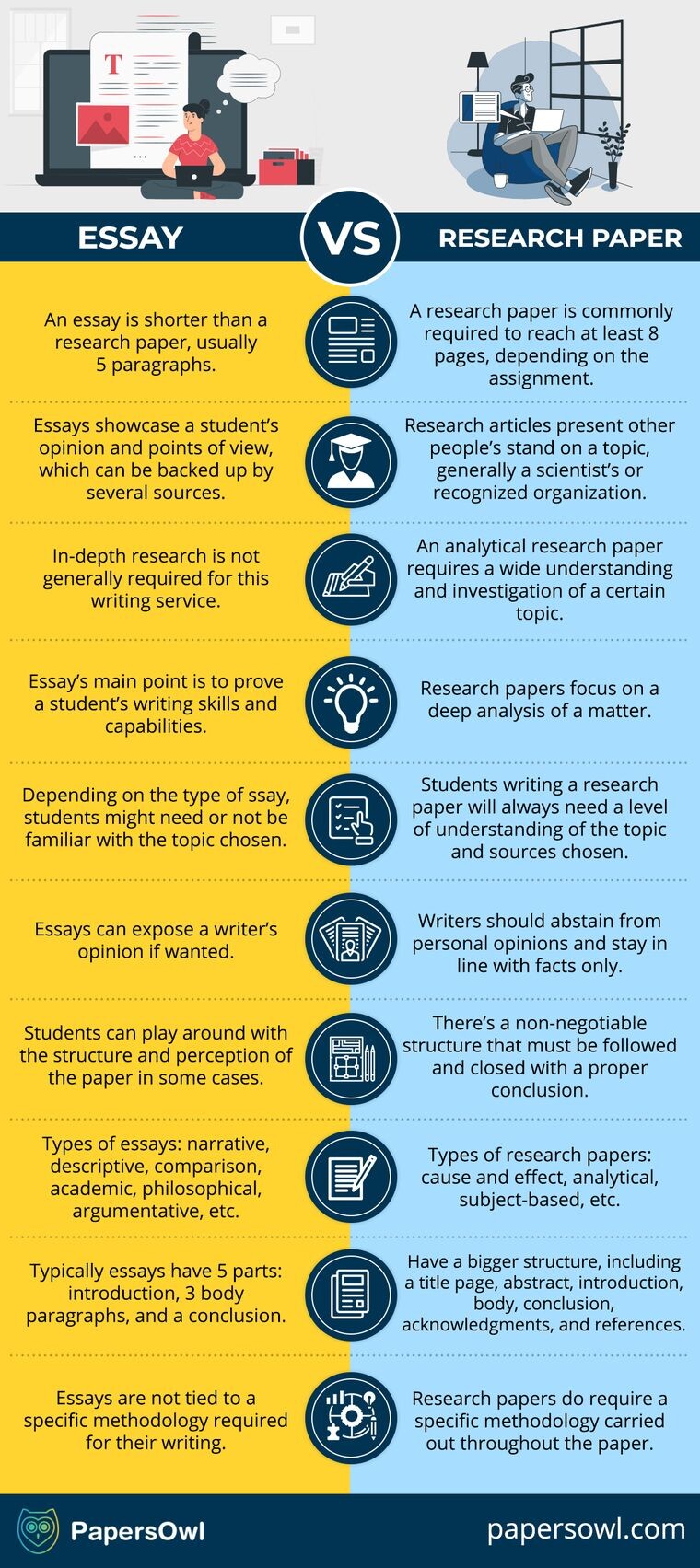
What Is the Difference Between Research Paper and Different Types of Papers
There are many types of papers, each focusing on different topics, serving different purposes, and requiring a specific structure. Those are different types of essays that share a common ground but differ in the way they present information and arguments.
Analytical paper. The purpose of such an essay is an in-depth analysis of the chosen topic, studying different approaches and points of view, and formulating one’s own conclusions based on the information studied and scientific evidence.
Argumentative paper. This type of essay takes as a basis an ambiguous topic; the author must take a certain position and provide a number of arguments.
Informative paper. It has an informative purpose — a presentation of information to the reader, preceded by careful analysis and selection of data.
Persuasive paper . The purpose of this paper is to present convincing arguments, using chosen writing techniques, confirming the author’s position regarding the selected scientific topic.
To get a high grade, you need to understand the requirements of academic requirements. No matter how informatively rich your work is, if it does not meet the requirements, it cannot be highly appreciated. Each type of academic assignment has its own clearly defined, unique format. It’s necessary to know the difference between a research paper vs argumentative essay so as not to get confused while completing a college assignment. So before you start writing an assignment, make sure you understand the type of academic writing required of you.
Let’s Sum Up
Research papers and essays are aimed at testing various skills of the student, following different structures, and having several requirements. An essay is a more creative writing task, which involves showing originality and expressing a personal opinion on a certain topic. At the same time, a research paper is a type of scientific writing that adheres to a strict structure and uses a formal tone. Understanding the main differences will make your writing process easier, saving you time researching the requirements. Remember that knowing the essence of the assignment is a key factor in writing a decent paper.
Readers also enjoyed

WHY WAIT? PLACE AN ORDER RIGHT NOW!
Just fill out the form, press the button, and have no worries!
We use cookies to give you the best experience possible. By continuing we’ll assume you board with our cookie policy.

Research Papers Vs. Essays (Differences and Similarities)
In high school, college, university, and even professional life, you will write many assignments, including research papers and essays. In school, instructors and professors use essays and research papers to test your understanding of concepts taught in class. It is, therefore, imperative to know the difference between essays and research papers.
You came to the right place if you struggle to get the facts right about essays vs. research papers. This guide guides you through the similarities and differences between the two common papers written at all academic levels.
In a nutshell, research papers focus on facts to argue a point, while essays focus on an individual's understanding of a topic. Understanding the difference between these two pieces of writing will help you succeed in school.
With that said, here is an overview of essays and research papers.
What is an Essay?
An essay is a short piece of writing demonstrating your comprehension, critical thinking, analytical skills, creativity, and awareness of a given topic. The length of the essay will determine the citations it should have and how long it takes to write it. So for a 500 words essay, the instructor will require at least five verifiable sources. Since they are short in length, they usually have five paragraphs starting with an introduction, followed by the body, and then a conclusion.
The main objectives of an essay are to:
- Inform the reader by providing accurate and proven information about a particular topic
- Convince the audience of a specific headline using researched evidence
- Explain a topic by providing in-depth information with flowing content
- Entertain the readers through humor and other funny statements
Check out our comprehensive guide on how to write a good essay .
Format and Structure
The basic format of an essay is an introduction, body, and conclusion. You must fashion all the ideas- one at a time - in the order that makes sense. To successfully deliver the content to the readers, you must attend to their logic. You have to introduce the arguments, analyze all the data, provide counterarguments and conclude the topic.
You should consider every part of the essay answering basic questions the reader is probably asking. These questions are: what, how, why.
The "what" explains what evidence leads you to your thesis statement, and you must therefore examine all the evidence demonstrating the truth of your fact.
The "how" explains how other arguments can counter your thesis statements. In other words, how does another way of looking at things affect your claims?
The "why" shows why the readers should care about your statements and allows them to learn more about what you are saying in a larger context.
An essay follows different formats depending on the academic style of writing requested; it could be MLA, APA, or Chicago format. For example, the APA style is used in social and health sciences, MLA in liberal arts, Language, Literature, and humanities, and the Chicago style in literature, history, and arts.
However, the structure is as follows:
Introduction
The introduction paragraph sets the stage for what is to come. It has three main parts:
- Background information
- Thesis statement
The first sentence of the introduction should grab the reader's attention . Next, you should arouse curiosity through an eye-catching statement for the reader to continue reading the essay. You can achieve this by using a joke, statistics, or research findings.
Background Information
Give the readers the context of the essay by providing some background information depending on the essay's subject. Don't give too much information — mention just a few points you will divulge later in the text. Just make sure you save the evidence for the body of the essay. The length of this information will depend on the scope of your essay.
Thesis Statement
A thesis statement sums up the main ideas of your topic and helps control the essay's narrative. Therefore, the statement should state clearly the main idea you want readers to grasp.
Body (Arguments)
The body is the longest part of the essay, which is organized into different paragraphs. Each paragraph elaborates on one idea and contains between four to five sentences. Every paragraph contains three sections starting with the topic sentence, followed by a supporting sentence and a concluding sentence.
The topic sentence informs the reader about the paragraph, and the supporting sentence expounds on the central idea. And the concluding sentence summarizes what you have talked about.
The conclusion is the last paragraph of the essay. It aims to summarize the essay's main parts, show the essence of your argument, and leave the reader with a sense of closure.
When writing the conclusion paragraph of an essay , you should restate the thesis statement to remind the reader what you talked about, followed by a summary of your arguments and counterarguments. Finally, the last sentence of the paragraph should state your concluding thought.
Types of Essays
There are different types of essays, each with its own objectives. They include:
- Descriptive
- Argumentative
Narrative Essays
Narrative essays are mostly personal, and they tell a story. This essay is written from a first-person perspective.
Descriptive Essays
Descriptive essays describe something— object, person, place, emotion, or situation from your own perspective.
Expository Essays
Expository essays aim at explaining a topic with facts. This is where you analyze a given piece of information and explain in detail how you have reached your conclusion.
Argumentative Essay
An argumentative essay presents both sides of an argument to inform the reader. An instructor will give this type of essay to gauge your debating skills.
Persuasive Essay
The persuasive essay aims to convince the reader. The writing presents logical information with an emotional appeal to the reader to believe your point of view.
What is a Research Paper?
A research paper is academic writing that involves supportive evidence about a given topic. It provides a perspective on a given topic using various sources supported by qualitative and quantitative research methods.
Research papers are usually similar to essays, but they are much longer and involve in-depth research conducted independently. In addition, you must spend time investigating and evaluating multiple sources to offer an interpretation of a given text.
Since the main aim of a research paper is to develop a new argument, you must include a literature review. A literature review is a foundation and support for your research, and it is a survey of academic sources on a given topic that helps you identify theories, methods, and gaps in the existing research.
They are more formal as they involve rigorous and thorough research resulting in a central idea. Only when a paper meets this requirement will the instructor give a good grade. Their aim is to differentiate between opinions and facts, provide a detailed understanding of a given topic, and critique previously written work.
To effectively write a research paper, you must clearly define your research question. If your instructor has already assigned you a topic, there is no need. If not, try to choose an interesting research question.
Choose a research strategy by analyzing the materials you will use for your research. Then evaluate all the sources by focusing on their credibility and whether they support your research question.
Like essays, research papers also have paragraphs and follow the same academic writing formats, but their structure is much different. Their structure is as follows:
- Materials/methods
Acknowledgments
A title page contains all the vital information about the paper you are writing. The page is usually placed in front of the research paper. It contains your name, the name of the project, and your learning institution. Since it's the first page the reader will see, it should be well formatted. The title on the page should clearly display your thesis statement.
The abstract highlights the main points of your projects to help inform the readers what the paper is about. They are recorded along with keywords to help readers find your content more easily. The abstract should be clear and accurate.
An introduction part allows you to define the topic and establish your voice. The introduction should be interesting enough to get the reader hooked. It usually aims at:
- Presenting the problem statement, topic, and research investigation in the first part of the introduction
- Establish the aim and focus of your research in the second part
- Present the summary of your arguments in the third part
Research papers also have a thesis statement, like essays mostly found at the end of the introduction. It aims to explain what you are trying to prove and provide the main points in the research.
Materials/ Methods
The material/ methods section clearly defines what materials you used to perform your research. The aim is to direct readers to specialized materials, general procedures, and methods to weigh the value of your project. For example, these materials could be questionnaires that provide information about your paper. The materials should be specific and relevant to your field of study.
You should describe in detail how you conducted the analysis in their personal narrative and briefly list the methods used.
The results section is where you report what your findings are based on all the information you gathered with the materials you had. You should state the findings without biases or interpretation, allowing the reader to do that themselves. The findings should only be from your study, and they could be:
- Quantitative information - is data that can be measured and is presented in graphs, tables, or charts.
- Qualitative information - which is brief descriptions or explanations and is often presented as lists or essay like form
The discussion section shows the results and outcomes of your paper. It reviews and interprets the findings of the research and allows the readers to see the connection between all the parts of the paper. The discussion should include the following:
- Results you gathered from the research
- Discussion of related research
- Comparison between the research and your initial hypothesis
You must demonstrate your critical thinking skills when developing your arguments and establishing the relationship between each part the same way you would in an essay.
The conclusion section outlines why the research is important to the reader and why they should care. It summarizes all the parts mentioned in the paper and demonstrates the implications of your research. The writing should be on point to deliver your message to the readers.
The acknowledgment section appreciates all the contributors for their efforts in the research. You should mention all the contributors directly involved in your research. They could be:
- Funding Organization/ Donor
- Administrative personnel
- Your professors
- Work supervisors
The reference section is the last part of your research paper. This section shows that you have clearly and carefully conducted your research. It demonstrates that your work is credible, and readers can rely on it. You should list all the research material used. The average number of references in most research papers is 45.
Types of Research Papers
Like essays, there are different research papers, each requiring different preparation. These are argumentative and analytical research papers:
Argumentative Research Paper
When writing an argumentative research paper, you discuss your topic and then choose the stand you will be taking. The hope is to persuade the reader to take your stand.
Analytical Research Paper
You state your topic in an analytical research paper and take a neutral stance. You will then provide your arguments and facts, leaving the reader to choose their stance. The aim is not to persuade the reader but to present a well-supported analysis of a given topic.
Survey Research Paper
Survey research involves collecting data from a group of people through quantitative and qualitative research methods.
Experimental Research Paper
Based on experimental research or empirical research, this type of paper provides information about the procedures you have used in your research. It is mainly written as a scientific or empirical paper following the IMRAD format.
Definition Paper
In definition papers, you will describe an argument's facts without sharing personal emotions and only provide a list of facts without analyzing them.
What is the Aim of the Research Paper?
Learning how to write a research paper is to:
Provide Knowledge
Through research, you will gain new insights about a particular topic making you more knowledgeable.
Boost the Success, Not Business
The findings of a research paper will influence decision-makers to take positive action. For instance, if you wrote a paper about the importance of using laptops in schools, more laptops will be provided even to learners.
Enhance Public Awareness
By writing compelling research about a given headline and sharing it with the public, you give them an understanding of your ideas. Providing detailed and well-researched information will help the readers see the relevance of your conclusion.
What Are the Differences Between an Essay and a Research Paper?
After looking at each of them individually, what are the differences between them?
They Have Different Purposes
Even though they are both academic writings, they have different purposes. When an instructor assigns you a research paper, they want to know your deep understanding of a given topic by sharing how you have come to that realization. In other words, it demonstrates your opinions and those of other scientists. On the other hand, an essay shows your opinion about something even though you will research your information, and your point of view about the topic should be unique.
A Research Paper is More Formal
A research paper involves in-depth research from reputable sources, which you should prove in the form of references. On the other hand, an essay doesn't need in-depth research; it mainly relies on your thoughts and opinion. They are also not as complex as a research paper in terms of headings and subheadings.
More Time and Effort Are Needed in Writing a Research Paper Than an Essay
A research paper is a long piece of academic writing that requires multiple sources and a deeper understanding of information to reach a conclusion. Since there is tons of information to find and go through, more time is taken to do the research.
So while an essay can be completed in a few hours, a research paper can take days or even weeks to complete.
Differences in Length
Both essays and research papers are organized the same way. An essay has three parts: an introduction which includes a thesis statement, a body, and a supportive conclusion. You will need to hook your readers when writing the introduction for them to proceed with writing. The body usually has between four to five paragraphs which must be arranged systematically to make sense to the reader. Their word count ranges between 500 and 1000 words with about 5 citations.
Because research papers require in-depth research, they are much longer than essays and are usually referred to as multipage writing. A research paper typically has nine parts arranged in order with between 8 to 100 references. Regardless, both forms of academic writing follow the same organizational structure.
Here is a table that shows the similarities and differences between the two.
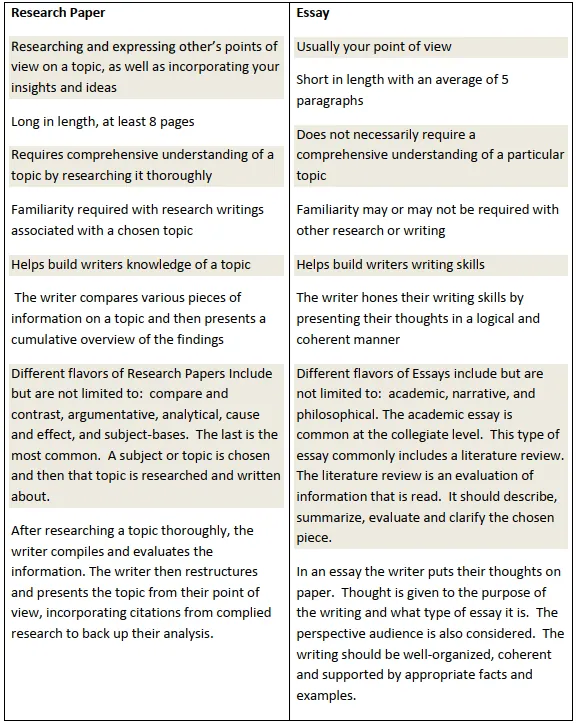
More differences and similarities between essays and research papers ( source )
Final Words
An essay and research paper are common types of academic writing assigned to high school, college, and university students. Essays are the shortest pieces of writing which show your understanding of a given topic during a research paper. The above difference will help you in your academic writing journey.
Life is full of demands, and you will juggle work, home duties, family responsibilities, and social life. When you add studies and writing papers to the packed schedule, you might break down mentally.
Do you need help with a research paper or an essay ? GradeCrest is the most preferred place for students and professionals who want their research papers done. We have expert paper writers who can handle papers on various topics and almost all subjects; no subject lacks an expert or is too hard to crack for us. You can order your essay or research paper by filling out the order form on our home page.

Gradecrest is a professional writing service that provides original model papers. We offer personalized services along with research materials for assistance purposes only. All the materials from our website should be used with proper references. See our Terms of Use Page for proper details.

- Privacy Policy

Home » Essay Vs Research Paper
Essay Vs Research Paper
Table of Contents

An essay and a research paper are two different types of academic writing assignments that students are often required to complete during their academic careers.
An Essay is a piece of academic writing that typically presents the author’s personal opinion or interpretation on a particular topic. It is a relatively short piece of writing that may be persuasive, descriptive, or informative in nature. Essays may be assigned to students as homework, in-class assignments, or as part of an exam.
Research Paper
A Research Paper , on the other hand, is a type of academic writing that involves conducting research on a particular topic, analyzing and interpreting the findings, and presenting the results in a written format. Research papers are usually longer and more complex than essays, and require a more extensive analysis of the topic. Research papers are often assigned to students as part of a course, such as a research methods course or a capstone project.
Difference Between Essay and Research Paper
Here’s a comparison table that highlights the differences between essays and research papers:
Also see Research Methods
About the author
Muhammad Hassan
Researcher, Academic Writer, Web developer
You may also like

Inductive Vs Deductive Research

Exploratory Vs Explanatory Research

Basic Vs Applied Research

Generative Vs Evaluative Research

Reliability Vs Validity

Longitudinal Vs Cross-Sectional Research

- Customer Reviews
- Extended Essays
- IB Internal Assessment
- Theory of Knowledge
- Literature Review
- Dissertations
- Essay Writing
- Research Writing
- Assignment Help
- Capstone Projects
- College Application
- Online Class
Essay vs Research Paper: What are the Differences?
by Antony W
September 10, 2021

This is the most comprehensive guide on essay vs research paper .
We’ll look at the differences and similarities between the two papers so that you can approach either assignment with clarity and certainty.
To begin with, essays and research paper examine your research, writing and analytical skills. They also require adherence to strict formatting and the inclusion of citation and bibliography.
What’s an Essay?
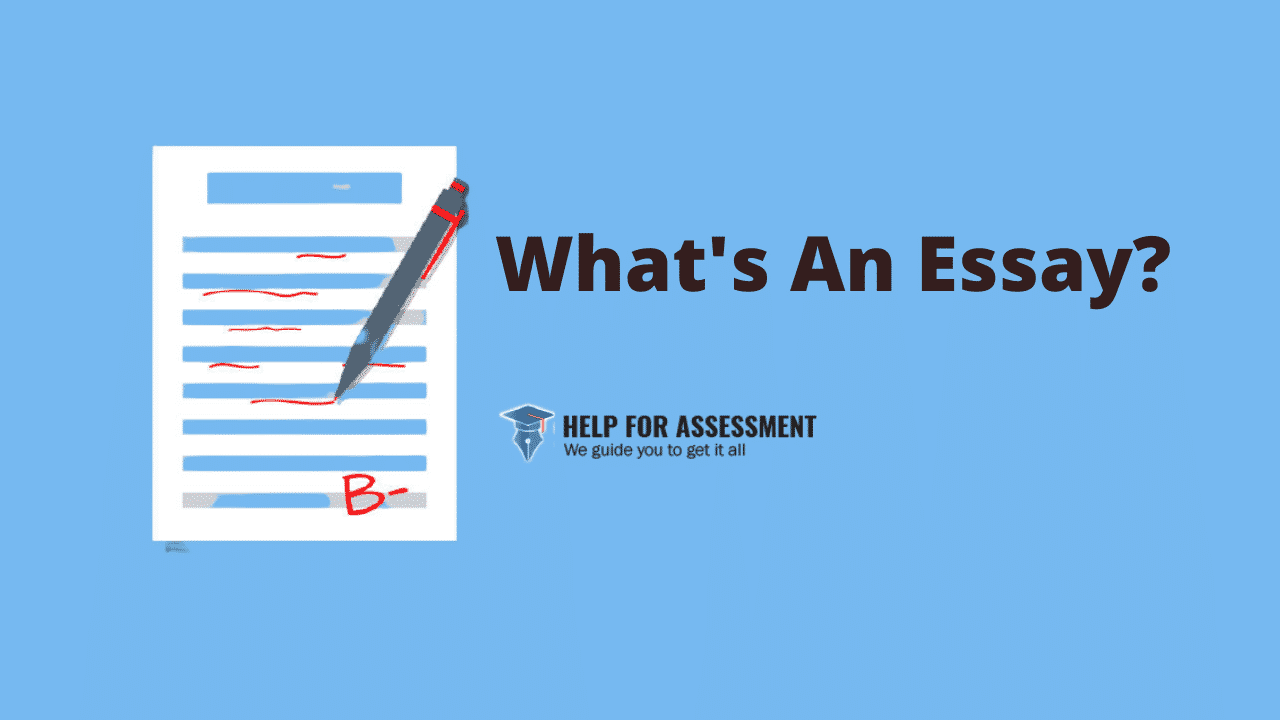
An essay is a written academic assignment that requires you to look into an issue and then provide your personal opinion while using credible sources and verifiable evidence to support your work.
In addition to knowing the different types of essays , you need to have excellent research and writing skills to write great essays that earn full marks.
The length of an essay varies from topic to topic. A shorter essay is about 500 words and longer ones can go up to 4,000 words .
Shorter essays don’t require extended research and you can therefore write them in one sitting.
Longer essays, on the other hand, demand in-depth research and attention to details. They can be quite time consuming to write and edit, which part of the reasons why students seek for writing help.
So if you have a longer essay to complete within a short deadline, check our essay writing service and let us help you get the essay completed in time.
What Essays Do Students Write in School?
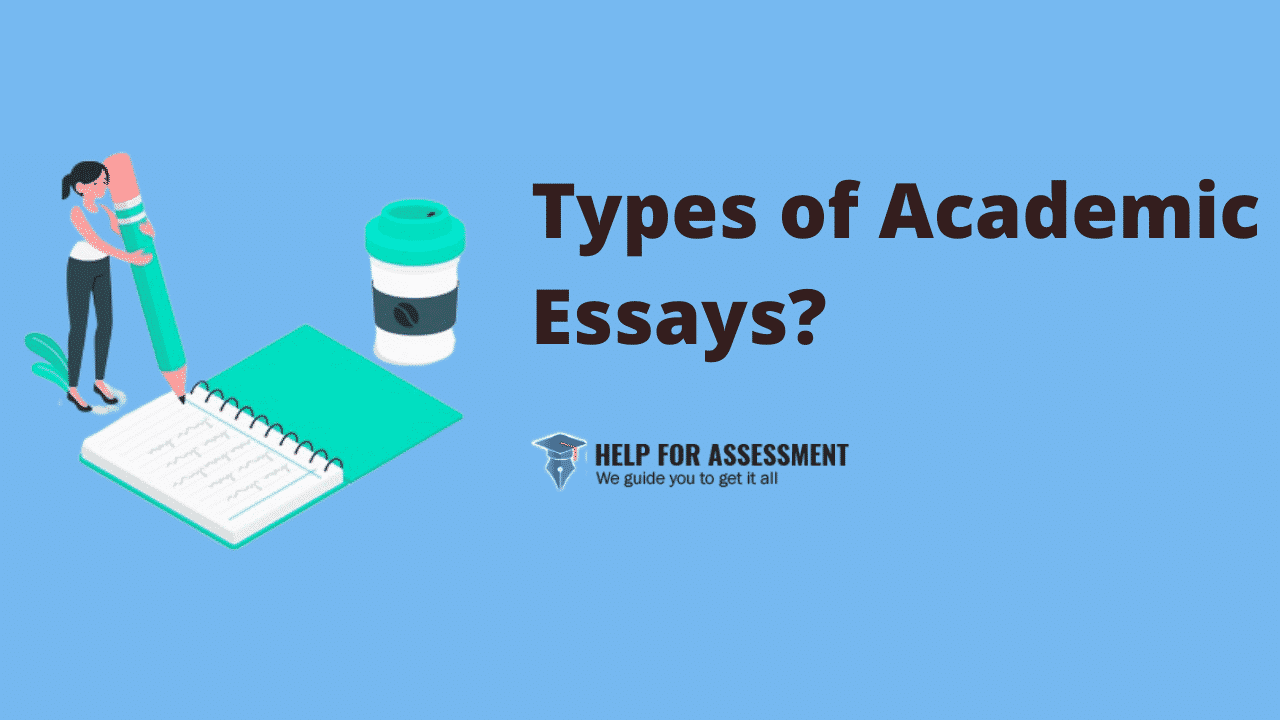
The following are some of the most common essays that you’ll write in high school, college, or university.
1. Descriptive Essays
If asked to write a descriptive essay, focus on explaining the characteristics of a subject or issue.
Descriptive essays require some literary devices , such as similes and metaphors, to read well and communicate your message. You can check our guide on how to write description essays .
2. Comparison Essays
In a compare and contrast essay , you have to explain the differences and similarities between two subject. You can organize your writing based either on individual points or on the subjects.
3. Analytical Essays
Analytical essays don’t just appear in academic journals, newspapers, and magazines. They’re also common in academic settings.
In analytical essay writing , your work is to provide a substantive analysis of the topic without being biased.
3. Reflective Essays
In reflective essay writing , students have to examine experiences and explore the changes, challenges, developments, and growth that those experiences bring.
The standard format for a reflective essay is the same for all, but the format may change a little depending on the audience.
4. Argumentative Essays
In argumentative essay writing , you have to take a stance on an issue and use objective evidence to support your position.
Check out our argumentative essay hub here to learn more.
5. Academic Essays
Written at college and university levels, academic essay cover content in your coursework to gauge your writing skills and intelligence’s level.
These essays tend to be longer with the word count ranging between 3,000 and 5,000 words.
What’s a Research Paper?
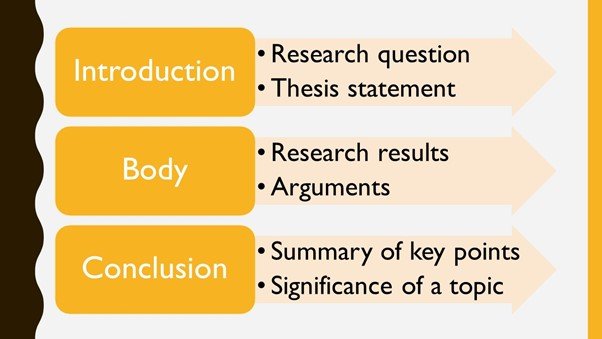
A research paper is an academic assignment that requires students to express their views on a subject using supportive sources such as books and journal articles.
They’re longer than typical essays and therefore take more time to research, write, and proofread.
In the case where you have more demanding assignments and a research paper waiting for you to complete, you can take advantage of our research paper writing service to get the project done in time.
Types of Research Papers

The following are the common types of research papers that you’ll write in college or university:
1. Analytical Research Paper
With this type of research paper, you choose a topic, collect information from credible sources, and use the data to draw your conclusion on the subject.
Maintain a neutral position when writing an analytical research paper.
2. Argumentative Research Paper
In argumentative research paper, you look into two controversial issues in the same document.
While you’ll look into both sides of the argument, you’ll have to take a side and use information from different reliable sources to persuade reader to take your side.
3. Experimental Research
Experimental research papers are practical in form. Your instructor expects you to describe procedures you used in your experiment, accompanied by in-depth data analysis and a written report.
4. Survey Research Paper
With survey research papers, you have to collect information from as many respondents as you can find. Then, you have to analyze the information and write a final report.

In this section, we’ll look at the differences between essays and research papers to give you more insight.
Differences in Writing
Since the primary objective of a research paper is to present a deeper knowledge of the subject, you have to do extensive research from different sources.
You also have to do a deep data analysis before writing so you can make a concrete conclusion.
Moreover, you have to be very conversant with the primary sources on the subject to write a good research paper.
With an essay, your goal is to show your teacher that you have good research and writing skills and can articulate your ideas in a way that shows your understanding of the given topic.
As such, essays won’t require deep research. In essay writing, you don’t necessarily have to be familiar with the main sources on a given subject although it’s important to.

Differences in Outline and Length
An essay has three parts: an introduction, the main body, and a conclusion. The body section has at least 3 paragraphs, but there can be more depending on the subject, research, and the number of ideas you’d like to present.
A research paper has more sections. Your work needs to feature a title page, an abstract (summary of the research), the main body (divided into sections such as methodology and results), a conclusion, references, acknowledgements, and references.
An essay can be as short as one page, especially if it’s on a topic that doesn’t require extensive research. In some cases, you may have to make your essay longer . So check the prompt to know how long your instructor expects you to make the essay.
On the other hand, a research paper is longer than a typical essay’s length and can span up to 8 pages or more.
Differences in Presentation
In essay writing, students present their personal views on a given issue or subject and use reliable academic sources to support their opinions.
In research paper writing, you have to present other scientists and researchers’ point of views of a subject and also add your opinion as a writer. Therefore, you must not only logically organize your ideas but also formulate them academically.
About the author
Antony W is a professional writer and coach at Help for Assessment. He spends countless hours every day researching and writing great content filled with expert advice on how to write engaging essays, research papers, and assignments.

Difference Between Research Paper and Essay
October 23, 2023

Description: Comparison of research papers vs. essays, along with the explanation of the differences and similarities between the two types of academic papers. A short guide to understanding essay writing and research writing with definitions of the terms “essay” and “research paper”.
How Does Research Paper Differ From Essay?
Students often have to deal with two different types of academic writing assignments: an essay and a research paper. Writing essays and research papers can be difficult and confusing due to the many similarities they have. To avoid confusion when writing either of these, it’s important to learn their differences. Understanding the differences between an essay and a research paper is also a great way to improve your academic writing skills. This article aims to help you understand the key differences between essay and research paper writing assignments when you come across them. We’ll study their features, look for relevant academic terminology, and learn what differentiates them. To get to the bottom of the difference between these two academic assignments, we should first define essay vs research paper.
What is an Essay?
An essay is a short piece of writing that aims to express personal views on a particular topic. It should have at least three pieces of evidence to back up the argument. Essays are typically shorter in length and less complex than research writing. At the same time, essay writing has its own specifics, so using expert proofreading services is a good idea if you aren’t confident in your skills. It’s likely that you’ll write your first essay and research paper when in high school or college. Then arises the question, “Who will write my paper for me ?” A good essay should always have a creative component, so having good writing skills is a must. Essays often aren’t as scientific as research papers, yet they nevertheless need a clear structure. The basic essay writing guidelines recommend following a five-paragraph structure with an introduction, a body, and a conclusion.
What is a Research Paper?
A research paper is the in-depth study of a chosen scientific topic that aims to generate new scientific findings based on previous studies and experiments. It isn’t enough for students to just state the facts or give their opinion on this topic. Your professor will evaluate your ability to think critically, choose trustworthy sources, and have a solid theoretical grounding in the topic of your research. Writing a research paper takes originality, knowledge, and subject matter expertise. Compared to traditional essay writing, research work has a different objective and structure. Research papers use data from primary sources like books on the topic, academic papers, interviews, web sources, and journals. The basic research writing guidelines recommend following this pattern: introduction, methods, results, discussion, and conclusions/recommendations. Research papers may also include acknowledgments, a brief biography of the author for some Master’s or Ph.D. works, references, endnotes, footnotes, and so on.
Key Differences Between Essay and Research Paper
The biggest difference between a research paper and an essay is that a research paper must have a strict methodology and set of study objectives. A research paper should outline a problem and the approaches that can be used to solve it effectively. Meanwhile, an essay can present a personal opinion without any references. Now let us go over other key differences between an essay and a research paper. The following comparison table outlines the key differences between essays and research papers:
Similarities Differences Between Essay and Research Paper
It makes sense that you could find it challenging to tell the difference between an essay and a research paper since there’re so many similarities between the two types of academic papers. That’s why it’s important to learn about the similarities of the two as well.
- Research: Basic research is still necessary in both. Even though you don’t need to do in-depth study for an essay, you still need to at least fact-check your information. However, for a research paper, you’ll need to cite more sources to demonstrate that you’re doing more than simply skimming the topic.
- Structure: The research paper has multiple paragraphs, much like an essay. Although the structure is a little different, the material presented in each paragraph should be in an easy-to-follow format to save the reader’s time from having to wade through irrelevant data and concepts. There should be an introduction, body paragraphs, and a conclusion in both types of papers. When you want to conduct research, there’re some differences, but there’re also a few similarities because you need to present the topic properly.
- Thesis statement: Both types of papers should have a thesis statement that presents an opinion, an argument, or a hypothesis. Even though it isn’t always required for an essay, adding a thesis statement will make your essay sound even more scientific.
- Format and Style: Your professor might recommend a specific format for your paper depending on the topic matter and the class itself. The liberal arts and humanities normally utilize the MLA and Chicago/Turabian formats, while the social sciences typically use the APA format. Both research papers and essays must follow specific formatting guidelines for headers, footers, in-text citations, reference pages, and other elements. These forms guarantee consistency and point readers to the relevant sources.
Research papers and essays are two different types of writing. We can draw the conclusion that the key differences between essays and research papers are those relating to purpose, structure, and format. Even though these two types of papers have many things in common, essays and research papers are written for different purposes. The requirements for a research paper are stricter because it must follow the right structure, format, and methodology. However, an essay is more forgiving because it has a descriptive narrative that allows the author to express their own opinions. Please be advised that the views, thoughts, and opinions expressed in this blog are solely that of the author or his/her sources and do not necessarily reflect those of English Forward. This includes, but is not limited to, third-party content contained on or accessible through the English Forward websites and web pages or sites displayed as search results or contained within a directory of links on the English Forward network.
7 Common Pitfalls in English Translations
The top 10 slang words of young people nowadays, leave a comment cancel reply.
Save my name, email, and website in this browser for the next time I comment.

The Writing Planet

50 % off on all orders
What Is The Difference Between Research Paper and Essay

Whether you are a high school or university student, it is essential to realize that academic writing involves the development of essays and research papers. The ability to compose these types of assignments is essential for academic achievement. Unfortunately, an essay and a research paper share many similarities, and the majority of students do not comprehend the differences between the two; thus, they wind up producing a research paper instead of an essay, and vice versa.
It is important to note that an essay and a research paper share qualities, such as the necessity for extensive study, writing abilities, a specified length, the requirement for citations, and the ability to construct a bibliography.
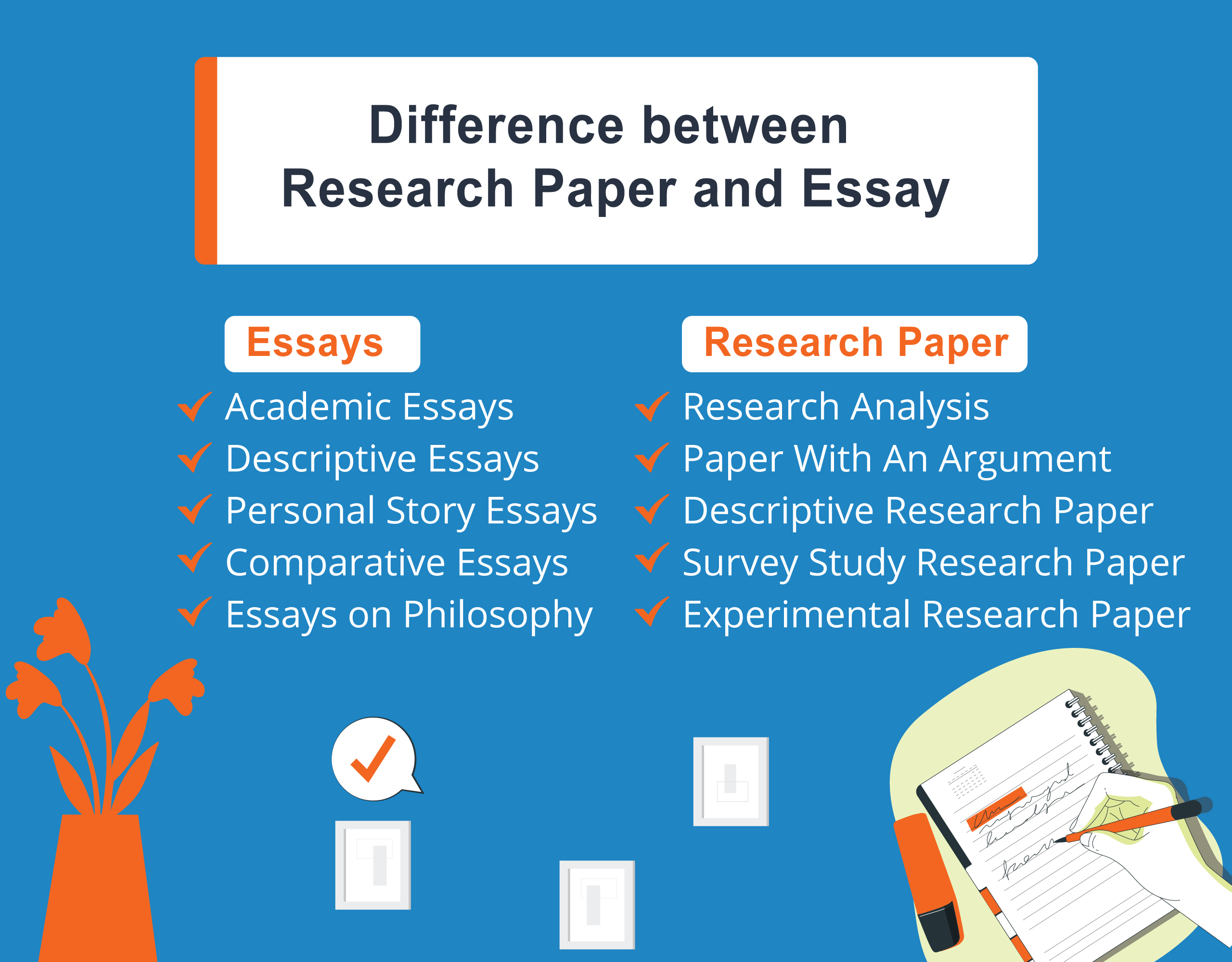
What Is An Essay Exactly?
An essay is a sort of academic writing that often consists of less than five paragraphs. Writing an essay, unlike other forms of writing, demands a significant level of imagination as well as exceptional writing abilities. Remember that a high-quality paper must be rationally organized and backed by evidence that can be verified.
A common purpose of an essay is to communicate one’s opinion on a certain issue. Your perspective is formed by how you interpret and utilize external sources. The number of citations utilized in an essay is determined by the length of the paper. For instance, the majority of instructors want at least five references for an essay of 500 words.
Essay writing is one of the most common tasks assigned to high school and college students. It is essential to note that essays are often brief writings (less than one thousand words) whose primary purpose is to allow teachers to evaluate students’ writing, reading, persuasive, and analytical abilities.
Types of Essays
The types of classifications for essays are presented below.
Academic Essays
Typically, academic essays are required at the college and university level. Remember that these papers are based on the information supplied in your coursework as well as external sources. These articles are also longer, ranging from 3000-5000 words in length. Most importantly, these tests are meant to evaluate students’ intelligence.
Descriptive Essays
The purpose of descriptive essays is to stimulate the reader’s senses by describing the characteristics of a certain topic or issue. To produce an excellent descriptive essay, you must use the appropriate devices, such as adjectives, similes, metaphors, etc.
Personal Story Essays
A narrative essay is a factual or fictitious summary of your life experiences intended to enlighten the audience. Typically, narrative essays are written in the first person to enhance the reader’s understanding of the author’s experience.
Narrative essays are written from the author’s perspective and are meant to captivate the reader with the story’s progression. To create an engaging story, you must use correct writing techniques, such as character development, setting, climax, and resolution.
Comparative Essays
A comparison essay contrasts and compares two subjects to demonstrate their similarities and differences. It is essential to keep in mind that a comparison essay is intriguing when two contrasting things, such as apples and mangoes, are compared.
The opening paragraph of a comparison essay has a thesis statement that highlights the two subjects to be contrasted. For instance, “organic bananas may be more expensive than naturally grown bananas, but they are worth the extra expense.”
Comparison essays might be organized according to topics or specific points. It is vital to remember that the order depends on the article’s purpose and readership.
Essays on Philosophy
A philosophical essay employs a logical argument to support or defend a stance. The objective of a philosophical essay is to enable you to effectively express ideas to your audience using appropriate language.
The steps to creating an excellent philosophical essay are as follows.
- Mention the claim to be shown;
- Support or offer an argument for the claim;
- Justify why the argument is acceptable;
- Demonstrate that the propositions are true;
- Consider and respond to criticism of your claim; and
- Summarize the evidence presented.
It is crucial to remember that the topic you choose will determine the quality of your philosophical essay. Consequently, ensure that the topic you select is both engaging and capable of withstanding a complete academic investigation.
What Is A Research Paper Exactly?
The research paper is described as an original piece of writing that contains the study’s findings. “Research” refers to the continual investigation of various methods to justify the central purpose statement or issue under consideration. There are typically two types of research papers: quantitative and qualitative.
For cognitively bright children, the word “research paper” elicits a flutter of excitement. This is not always the case, though. In reality, it is best to think of a research paper as an enlarged essay. In general, the framework of both types of writing is similar; however, you may be required to include a thesis question (which is not typically required for other essay types), conduct extensive research, and provide evidence to support your beliefs. It is possible that you may be expected to incorporate a number of trustworthy sources into your work, which will be listed as references. And, perhaps most importantly, focusing on the informative article will be more enjoyable if you choose a topic that you are interested in researching.
Students are encouraged to do research, but their conclusions must be supported by trustworthy sources. The normal length for a research paper is between 5 and 15 pages. After obtaining all necessary material from several sources, the student’s work will be organized into a framework for their consideration. Teachers regularly set these tasks for pupils in order to teach them how to balance their writing abilities and to encourage structural uniformity and the use of the standard format.
In addition, research papers are frequently used to gain authentic information on a particular topic, after which the student collects evidence during the exploratory phase and summarizes the results by providing a basic analysis or disposition. It is advisable that you seek free research paper samples before writing your own, as this will help you grasp the whole concept.
APA, Chicago, and MLA, to name a few, are citation formats frequently used in research articles. The text has a consistent emphasis and considerable study, and it provides precise information and an understanding of the subject while separating opinions from facts. The paper’s results and conclusions are also effective. Among other names, a research paper is sometimes known as a research project and a term paper.
Types of Research Papers
As a student, it is crucial to comprehend the many types of research papers, as each requires a unique writing strategy. The kind of articles that follow is indicated.
Research Analysis
In an analytical research report, you compile information from the findings of other researchers to draw a conclusion on a certain topic. In this essay, it is preferable to maintain objectivity and avoid expressing positive or negative opinions.
Research Paper With An Argument
In a single text, an argumentative research paper discusses two disputed topics. It is vital to remember that while writing these essays, you should provide information from several scholars to support either side of the topic, but you should favor one side over the other as you attempt to persuade the reader to your position. In addition, this type of research paper has more than one hundred great argumentative topics.
Descriptive Research Paper
A descriptive research paper delivers information without the author’s personal opinion. It is essential to use a range of sources without evaluating the content when writing this piece.
Survey Study Research Paper
A survey involves collecting data from respondents, analyzing the data, and producing a report with the findings.
Experimental Research Paper
In an experimental research paper, you discuss the procedures used in the experiment, evaluate the outcomes, and then write the report.
Comparisons of an Essay and a Research Paper
The main difference between a research paper and an essay is that research papers are often lengthier than essays, which are typically four to five paragraphs long. A research paper is a longer piece of writing than one page. In contrast to research papers, which usually involve an argument for or study of a topic, essays provide responses to questions.
Research papers use information from various sources to support their points, whereas essays depend mostly on the author’s own opinions and experiences.
The purpose of creating a research paper is to conduct and publish a report that contains the author’s unique and exhaustive study on a particular topic. Essays are written with a specific purpose in mind: to analyze previously published content on a specified topic. When writing essays, one may express one’s own opinions on a certain topic.
A research report reveals the author’s in-depth investigation of a certain issue. This is considered “primary literature” in academic circles. There is no original research included in essays, only already published content. The term for this kind of literature is secondary literature.
Data Collection
After the creation of research questions, the acquisition of raw data, and the preparation of research papers, researchers perform studies. The author chooses a topic and provides a summary of previously published material as well as his or her own viewpoint on the subject.
The content of the research paper is based on the analysis and application of past research. The substance of the articles provides an overview and foundational knowledge of the subject.
A research paper describes each part of the investigation, including the hypothesis, literature evaluation, methods, and findings. On a certain topic, essays summarize existing research and perspectives.
? ? ?Word Count
The word count of a research paper may range between 3000 and 12000. The average length of an essay, on the other hand, is between 3000 and 5000 words.
Due to their similarities, an essay and a research report are difficult to differentiate. In order to prevent confusion when writing, it is crucial for students to comprehend these distinctions. Numerous research papers are around eight pages long, and they are often longer than essays. The length of a research paper makes its composition more challenging than that of an essay.
Frequently Asked Questions
How different are essays and research papers.
An extended essay in which you offer your own analysis, viewpoint, or argument is called a research paper. Writing an essay requires using all you know and have thought about the subject.
What are the similarities between an essay and a research report?
There is a lot of overlap between the essay structure and the research paper format. Each has an introductory and concluding paragraph. Each written assignment features a clear thesis statement or research subject at the outset, often toward the end of the introductory paragraph.
To what end does one typically write such a paper?
A research paper’s goal is not only to educate the reader on what others have said about a topic; rather, it is to intelligently give a separate position on the situation at hand by drawing on and engaging the sources. There are two primary types of research papers used for this purpose.
Previous Posts

Write My Research Paper for Me to get an ‘A ‘ grade?

Research Paper Help – Professional Writing Assistance

How to Write an Outline for an Essay
Canvas | University | Ask a Librarian
- Library Homepage
- Arrendale Library
Writing a Research Paper
Types of research papers.
- About This Guide
- Choosing a Topic
- Writing a Thesis Statement
- Gathering Research
- Journals and Magazines This link opens in a new window
- Creating an Outline
- Writing Your Paper
- Citing Resources
- Academic Integrity This link opens in a new window
- Contact Us!
Call us at 706-776-0111
Chat with a Librarian
Send Us Email
Library Hours
Although research paper assignments may vary widely, there are essentially two basic types of research papers. These are argumentative and analytical .
Argumentative
In an argumentative research paper, a student both states the topic they will be exploring and immediately establishes the position they will argue regarding that topic in a thesis statement . This type of paper hopes to persuade its reader to adopt the view presented.
Example : a paper that argues the merits of early exposure to reading for children would be an argumentative essay.
An analytical research paper states the topic that the writer will be exploring, usually in the form of a question, initially taking a neutral stance. The body of the paper will present multifaceted information and, ultimately, the writer will state their conclusion, based on the information that has unfolded throughout the course of the essay. This type of paper hopes to offer a well-supported critical analysis without necessarily persuading the reader to any particular way of thinking.
Example : a paper that explores the use of metaphor in one of Shakespeare's sonnets would be an example of an analytical essay.
*Please note that this LibGuide will primarily be concerning itself with argumentative or rhetorical research papers.
- << Previous: About This Guide
- Next: Choosing a Topic >>
- Last Updated: May 16, 2024 10:46 AM
- URL: https://library.piedmont.edu/research_paper
- Ebooks & Online Video
- New Materials
- Renew Checkouts
- Faculty Resources
- Library Friends
- Library Services
- Our Mission
- Library History
- Ask a Librarian!
- Making Citations
- Working Online
Arrendale Library Piedmont University 706-776-0111

The Difference between an Essay and a Research Paper
If you don't know the difference between an essay and a research paper, you are not alone. The descriptions of the two types of writing are similar, but there are key differences. Most importantly, the difference is the work involved. If you're preparing to write your first research paper, get comfortable. It's going to take time and a lot of study.

For an essay, the most important viewpoint on the topic being written about is the writer's. After an essay writer does some research on their topic, they will develop a thesis statement and write body paragraphs with topic sentences that relate back to the thesis statement in order to develop their argument. An essay ends with a conclusion that summarizes the writer's point of view on the topic.
For a research paper, the most important viewpoint is that of others who have written on the topic. A research paper presents all the findings and conclusions other researchers have drawn.
The average essay will include approximately five paragraphs: an introduction, three body paragraphs, and a conclusion.
A research paper can get quite lengthy. Unless the topic being discussed is very new and there hasn't been a lot of prior research by other scholars, presenting all of the other conclusions reached on the topic may require many pages of writing.
Doing research for an essay is important and finding outside sources to support your argument may take some time, but research for a good research paper should be comprehensive. In other words, you'll need to know what every other scholar has argued about your topic in order to fully complete a research paper.
Essays have four basic types and structures: expository (presenting the information), descriptive (painting a picture for a reader using words), persuasive (arguing your point of view), and narrative (telling a story).
Research papers come in many different forms, but the most common are compare and contrast, argumentative, analytical, cause and effect, and interpretive. While a persuasive essay and an argumentative research paper use similar tones, a research paper must include as many of the existing arguments as possible for the writer's conclusion to be considered soundly formed.
No matter which type of writing you'll do, it's important to pick a topic that interests you. After all, you're going to be doing a lot of reading and writing about it. You'll just do a lot more reading and writing with a research paper than you will with an essay.
Reference management. Clean and simple.
Types of research papers

Analytical research paper
Argumentative or persuasive paper, definition paper, compare and contrast paper, cause and effect paper, interpretative paper, experimental research paper, survey research paper, frequently asked questions about the different types of research papers, related articles.
There are multiple different types of research papers. It is important to know which type of research paper is required for your assignment, as each type of research paper requires different preparation. Below is a list of the most common types of research papers.
➡️ Read more: What is a research paper?
In an analytical research paper you:
- pose a question
- collect relevant data from other researchers
- analyze their different viewpoints
You focus on the findings and conclusions of other researchers and then make a personal conclusion about the topic. It is important to stay neutral and not show your own negative or positive position on the matter.
The argumentative paper presents two sides of a controversial issue in one paper. It is aimed at getting the reader on the side of your point of view.
You should include and cite findings and arguments of different researchers on both sides of the issue, but then favor one side over the other and try to persuade the reader of your side. Your arguments should not be too emotional though, they still need to be supported with logical facts and statistical data.
Tip: Avoid expressing too much emotion in a persuasive paper.
The definition paper solely describes facts or objective arguments without using any personal emotion or opinion of the author. Its only purpose is to provide information. You should include facts from a variety of sources, but leave those facts unanalyzed.
Compare and contrast papers are used to analyze the difference between two:
Make sure to sufficiently describe both sides in the paper, and then move on to comparing and contrasting both thesis and supporting one.
Cause and effect papers are usually the first types of research papers that high school and college students write. They trace probable or expected results from a specific action and answer the main questions "Why?" and "What?", which reflect effects and causes.
In business and education fields, cause and effect papers will help trace a range of results that could arise from a particular action or situation.
An interpretative paper requires you to use knowledge that you have gained from a particular case study, for example a legal situation in law studies. You need to write the paper based on an established theoretical framework and use valid supporting data to back up your statement and conclusion.
This type of research paper basically describes a particular experiment in detail. It is common in fields like:
Experiments are aimed to explain a certain outcome or phenomenon with certain actions. You need to describe your experiment with supporting data and then analyze it sufficiently.
This research paper demands the conduction of a survey that includes asking questions to respondents. The conductor of the survey then collects all the information from the survey and analyzes it to present it in the research paper.
➡️ Ready to start your research paper? Take a look at our guide on how to start a research paper .
In an analytical research paper, you pose a question and then collect relevant data from other researchers to analyze their different viewpoints. You focus on the findings and conclusions of other researchers and then make a personal conclusion about the topic.
The definition paper solely describes facts or objective arguments without using any personal emotion or opinion of the author. Its only purpose is to provide information.
Cause and effect papers are usually the first types of research papers that high school and college students are confronted with. The answer questions like "Why?" and "What?", which reflect effects and causes. In business and education fields, cause and effect papers will help trace a range of results that could arise from a particular action or situation.
This type of research paper describes a particular experiment in detail. It is common in fields like biology, chemistry or physics. Experiments are aimed to explain a certain outcome or phenomenon with certain actions.


How to Write a Research Paper
- Smodin Editorial Team
- Updated: May 17, 2024
Most students hate writing research papers. The process can often feel long, tedious, and sometimes outright boring. Nevertheless, these assignments are vital to a student’s academic journey. Want to learn how to write a research paper that captures the depth of the subject and maintains the reader’s interest? If so, this guide is for you.
Today, we’ll show you how to assemble a well-organized research paper to help you make the grade. You can transform any topic into a compelling research paper with a thoughtful approach to your research and a persuasive argument.
In this guide, we’ll provide seven simple but practical tips to help demystify the process and guide you on your way. We’ll also explain how AI tools can expedite the research and writing process so you can focus on critical thinking.
By the end of this article, you’ll have a clear roadmap for tackling these essays. You will also learn how to tackle them quickly and efficiently. With time and dedication, you’ll soon master the art of research paper writing.
Ready to get started?
What Is a Research Paper?
A research paper is a comprehensive essay that gives a detailed analysis, interpretation, or argument based on your own independent research. In higher-level academic settings, it goes beyond a simple summarization and includes a deep inquiry into the topic or topics.
The term “research paper” is a broad term that can be applied to many different forms of academic writing. The goal is to combine your thoughts with the findings from peer-reviewed scholarly literature.
By the time your essay is done, you should have provided your reader with a new perspective or challenged existing findings. This demonstrates your mastery of the subject and contributes to ongoing scholarly debates.
7 Tips for Writing a Research Paper
Often, getting started is the most challenging part of a research paper. While the process can seem daunting, breaking it down into manageable steps can make it easier to manage. The following are seven tips for getting your ideas out of your head and onto the page.
1. Understand Your Assignment
It may sound simple, but the first step in writing a successful research paper is to read the assignment. Sit down, take a few moments of your time, and go through the instructions so you fully understand your assignment.
Misinterpreting the assignment can not only lead to a significant waste of time but also affect your grade. No matter how patient your teacher or professor may be, ignoring basic instructions is often inexcusable.
If you read the instructions and are still confused, ask for clarification before you start writing. If that’s impossible, you can use tools like Smodin’s AI chat to help. Smodin can help highlight critical requirements that you may overlook.
This initial investment ensures that all your future efforts will be focused and efficient. Remember, thinking is just as important as actually writing the essay, and it can also pave the wave for a smoother writing process.
2. Gather Research Materials
Now comes the fun part: doing the research. As you gather research materials, always use credible sources, such as academic journals or peer-reviewed papers. Only use search engines that filter for accredited sources and academic databases so you can ensure your information is reliable.
To optimize your time, you must learn to master the art of skimming. If a source seems relevant and valuable, save it and review it later. The last thing you want to do is waste time on material that won’t make it into the final paper.
To speed up the process even more, consider using Smodin’s AI summarizer . This tool can help summarize large texts, highlighting key information relevant to your topic. By systematically gathering and filing research materials early in the writing process, you build a strong foundation for your thesis.
3. Write Your Thesis
Creating a solid thesis statement is the most important thing you can do to bring structure and focus to your research paper. Your thesis should express the main point of your argument in one or two simple sentences. Remember, when you create your thesis, you’re setting the tone and direction for the entire paper.
Of course, you can’t just pull a winning thesis out of thin air. Start by brainstorming potential thesis ideas based on your preliminary research. And don’t overthink things; sometimes, the most straightforward ideas are often the best.
You want a thesis that is specific enough to be manageable within the scope of your paper but broad enough to allow for a unique discussion. Your thesis should challenge existing expectations and provide the reader with fresh insight into the topic. Use your thesis to hook the reader in the opening paragraph and keep them engaged until the very last word.
4. Write Your Outline
An outline is an often overlooked but essential tool for organizing your thoughts and structuring your paper. Many students skip the outline because it feels like doing double work, but a strong outline will save you work in the long run.
Here’s how to effectively structure your outline.
- Introduction: List your thesis statement and outline the main questions your essay will answer.
- Literature Review: Outline the key literature you plan to discuss and explain how it will relate to your thesis.
- Methodology: Explain the research methods you will use to gather and analyze the information.
- Discussion: Plan how you will interpret the results and their implications for your thesis.
- Conclusion: Summarize the content above to elucidate your thesis fully.
To further streamline this process, consider using Smodin’s Research Writer. This tool offers a feature that allows you to generate and tweak an outline to your liking based on the initial input you provide. You can adjust this outline to fit your research findings better and ensure that your paper remains well-organized and focused.
5. Write a Rough Draft
Once your outline is in place, you can begin the writing process. Remember, when you write a rough draft, it isn’t meant to be perfect. Instead, use it as a working document where you can experiment with and rearrange your arguments and evidence.
Don’t worry too much about grammar, style, or syntax as you write your rough draft. Focus on getting your ideas down on paper and flush out your thesis arguments. You can always refine and rearrange the content the next time around.
Follow the basic structure of your outline but with the freedom to explore different ways of expressing your thoughts. Smodin’s Essay Writer offers a powerful solution for those struggling with starting or structuring their drafts.
After you approve the outline, Smodin can generate an essay based on your initial inputs. This feature can help you quickly create a comprehensive draft, which you can then review and refine. You can even use the power of AI to create multiple rough drafts from which to choose.
6. Add or Subtract Supporting Evidence
Once you have a rough draft, but before you start the final revision, it’s time to do a little cleanup. In this phase, you need to review all your supporting evidence. You want to ensure that there is nothing redundant and that you haven’t overlooked any crucial details.
Many students struggle to make the required word count for an essay and resort to padding their writing with redundant statements. Instead of adding unnecessary content, focus on expanding your analysis to provide deeper insights.
A good essay, regardless of the topic or format, needs to be streamlined. It should convey clear, convincing, relevant information supporting your thesis. If you find some information doesn’t do that, consider tweaking your sources.
Include a variety of sources, including studies, data, and quotes from scholars or other experts. Remember, you’re not just strengthening your argument but demonstrating the depth of your research.
If you want comprehensive feedback on your essay without going to a writing center or pestering your professor, use Smodin. The AI Chat can look at your draft and offer suggestions for improvement.
7. Revise, Cite, and Submit
The final stages of crafting a research paper involve revision, citation, and final review. You must ensure your paper is polished, professionally presented, and plagiarism-free. Of course, integrating Smodin’s AI tools can significantly streamline this process and enhance the quality of your final submission.
Start by using Smodin’s Rewriter tool. This AI-powered feature can help rephrase and refine your draft to improve overall readability. If a specific section of your essay just “doesn’t sound right,” the AI can suggest alternative sentence structures and word choices.
Proper citation is a must for all academic papers. Thankfully, thanks to Smodin’s Research Paper app, this once tedious process is easier than ever. The AI ensures all sources are accurately cited according to the required style guide (APA, MLA, Chicago, etc.).
Plagiarism Checker:
All students need to realize that accidental plagiarism can happen. That’s why using a Plagiarism Checker to scan your essay before you submit it is always useful. Smodin’s Plagiarism Checker can highlight areas of concern so you can adjust accordingly.
Final Submission
After revising, rephrasing, and ensuring all citations are in order, use Smodin’s AI Content Detector to give your paper one last review. This tool can help you analyze your paper’s overall quality and readability so you can make any final tweaks or improvements.
Mastering Research Papers
Mastering the art of the research paper cannot be overstated, whether you’re in high school, college, or postgraduate studies. You can confidently prepare your research paper for submission by leveraging the AI tools listed above.
Research papers help refine your abilities to think critically and write persuasively. The skills you develop here will serve you well beyond the walls of the classroom. Communicating complex ideas clearly and effectively is one of the most powerful tools you can possess.
With the advancements of AI tools like Smodin , writing a research paper has become more accessible than ever before. These technologies streamline the process of organizing, writing, and revising your work. Write with confidence, knowing your best work is yet to come!
- Key Differences
Know the Differences & Comparisons
Difference Between Thesis and Research Paper
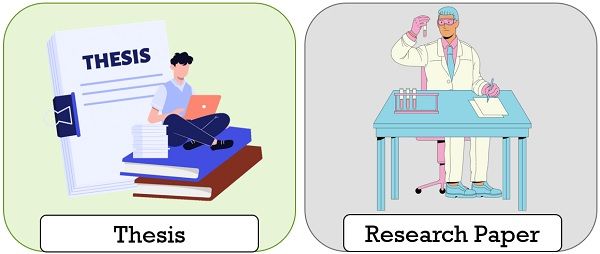
On the other hand, a research paper is analytical, argumentative and interpretative in nature. It involves the pursuit of knowledge and intelligent analysis of the information collected. It contains the idea of the author, often supported by expert opinions, research and information available in this regard.
Whether you are writing a thesis or research paper, they are equally challenging and take a lot of time to prepare. In this post, we will update you on all the points of difference between thesis and research paper.
Content: Thesis Vs Research Paper
- Key Elements
- Thesis Statement
How to start a research paper?
Comparison chart, what is thesis.
The thesis is a document containing the research and findings that students submit to get the professional qualification or degree . It has to be argumentative, which proposes a debatable point with which people could either agree or disagree. In short, it is a research report in writing that contains a problem which is yet to be dealt with.
In a thesis, the researcher puts forth his/her conclusion. The researcher also gives evidence in support of the conclusion.
Submission of the thesis is a mandatory requirement of a postgraduate course and PhD degree. In this, the primary focus is on the novelty of research along with the research methodology.
It is all about possibilities, by introducing several anti-thesis. Also, it ends up all the possibilities by nullifying all these anti-thesis.
Key Elements of Thesis
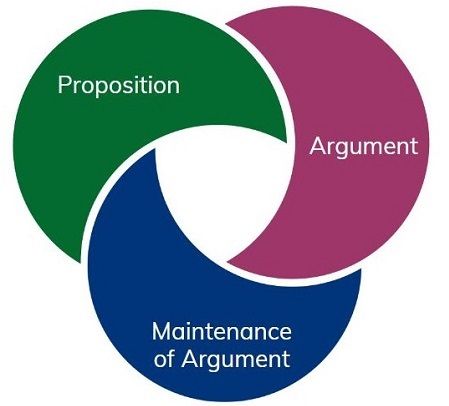
- Proposition : The thesis propagates an idea, hypothesis or recommendation.
- Argument : Gives reasons for accepting the proposition instead of just asserting a point of view.
- Maintenance of argument : The argument should be made cogent enough by providing suitable logic and adequate evidence.
Features of An Ideal Thesis
- An Ideal thesis is expected to add fresh knowledge to the existing theory.
- It communicates the central idea of the research in a clear and concise manner.
- An effective thesis is more than a simple statement, fact or question.
- It answers why and how questions concerned with the topic.
- To avoid confusion, it is worded carefully.
- It outlines the direction and scope of your essay.
- It gives reasons to the reader to continue reading.
Also Read : Difference Between Thesis and Dissertation
What is Thesis Statement?
A thesis statement is a sentence of one line, usually written at the end of your first paragraph. It presents the argument to the reader.
It is a blueprint of your thesis that directs the writer while writing the thesis and guides the reader through it.
What is Research Paper?
Research Paper is a form of academic writing. It is prepared on the basis of the original research conducted by the author on a specific topic, along with its analysis and interpretation of the findings.
An author generally starts writing a research paper on the basis of what he knows about the topic and seeks to find out what experts know. Further, it involves thorough and systematic research on a particular subject to extract the maximum information.
In short, a research paper is a written and published report containing the results of scientific research or a review of published scientific papers. Here, the scientific research is the primary research article, while the review of a published scientific paper is the review article.
In case of the primary research article, the author of the research paper provides important information about the research. This enables the scientific community members to:
- Evaluate it
- Reproduce the experiments
- Assess the reasoning and conclusions drawn
On the other hand, a review article is written to analyze, summarize and synthesize the research carried out previously.
When a research work is published in a scientific journal, it conveys the knowledge to a larger group of people and also makes people aware of the scientific work. Research work published as a research paper passes on knowledge and information to many people. The research paper provides relevant information about the disease and the treatment options at hand .
To start writing a research paper, one should always go for a topic that is interesting and a bit challenging too. Here, the key to choosing the topic is to pick the one that you can manage. So, you could avoid such topics which are very technical or specialized and also those topics for which data is not easily available. Also, do not go for any controversial topic.
The researcher’s approach and attitude towards the topic will decide the amount of effort and enthusiasm.
Steps for writing Research Paper

The total number of pages included in a Research Paper relies upon the research topic. It may include 8 to 10 pages, which are:
- Introduction
- Review of Literature
- Methodology
- Research Analysis
- Recommendations
Also Read : Difference Between Research Proposal and Research Report
Key Differences Between Thesis and Research Paper
- A thesis implies an original, plagiarism-free, written academic document that acts as a final project for a university degree of a higher level. But, Research Paper is a novel, plagiarism-free long essay. It portrays the interpretation, evaluation or argument submitted by a researcher.
- The thesis acts as a final project. Whereas a research paper is a kind of research manual of journals.
- The length of the thesis is around 20,000 to 80,000 words. On the contrary, the length of the research paper is relative to the study.
- The thesis focuses on the central question or statement of an intellectual argument that entails further research. On the contrary, the research paper is concerned with proving the central argument.
- The purpose of submitting the thesis is to get the degree or professional qualification. It also presents the knowledge of the candidate in the respective field. Conversely, the aim of publishing research papers is to prove credibility and contribute knowledge in the respective field.
- While the student submits the thesis to the educational committee or panel of professors who review it. In contrast, scientists and other researchers read and review the research paper.
- Preparation and completion of thesis is always under the guidance of a supervisor. For submission of the thesis, the university assigns a supervisor to each student, under whose guidance the thesis must be completed. As against, no supervisor is appointed as a guide in case of a research paper.
- The thesis contains a broader description of the subject matter. In contrast, the research paper contains a narrow description of the subject matter.
Once the research paper is published, it increases the fellowship and job opportunities for new researchers. On the other hand, thesis writing will enable the students to get the desired degree at the end of the course they have opted.
You Might Also Like:

Dr. Owenga says
February 23, 2023 at 2:38 pm
So good and informative. These are quite beneficial insights. Thanks
Leave a Reply Cancel reply
Your email address will not be published. Required fields are marked *
Save my name, email, and website in this browser for the next time I comment.
- Skip to main content
- Skip to search
- Skip to footer
Products and Services
Contact cisco.
To get global contact information, please make your selections in the drop-down menus.
Country/region and language
Get in touch
Please reach out to sales for general inquiries or to chat with a live agent.
Sales inquiries
1 800 553 6387 , press 1
Order and billing
1 800 553 6387 , press 2-1
Monday to Friday 8 a.m. to 5 p.m. Eastern Time Chat is available to you 24/7.
Find technical support for products and licensing, access to support case manager, and chat with support assistant. Technical support is available 24/7.
Enterprise and service providers
1 800 553 2447 (U.S. and Canada)
Small business
1 866 606 1866 (U.S. and Canada)
Training and certifications
1 800 553 6387 , press 4
Explore support
Explore certification support
Cisco partners
Become a partner, locate a partner, get updates, and partner support.
Explore Cisco partners
Get partner support
Find a Cisco office
Find offices around the world.
Locate offices
Corporate headquarters
300 East Tasman Drive San Jose, CA 95134
Legal mailing address
Cisco Systems, Inc. 170 West Tasman Drive San Jose, California 95134

Complete the form below or log in and the form will autofill. One of our sales specialists will call you within 15 minutes or on a date or time you request. Specialists are available Monday through Friday, 8 a.m. to 5 p.m. Eastern Time. We are currently experiencing delays in response times. If you require an immediate sales response – please call us 1 800-553-6387. Otherwise, a sales advisor will call you as soon as possible. * Required
Want to use a different email? Sign out * Required

- Master Your Homework
- Do My Homework
Research Paper vs Report: Breaking Down the Difference
The purpose of this article is to discuss the distinct differences between a research paper and a report. As academic writing has evolved, so too have the structures used to convey information in an organized and succinct manner. The distinctions between these two types of scholarly work are important for any student or researcher engaging in research-based activities as they can make all the difference when it comes to effectively conveying ideas and results accurately. This article will take an in-depth look at both reports and papers, discussing their similarities, differences, components, uses, and best practices for producing quality products that serve their intended purpose properly.
I. Introduction to Research Paper and Report Writing
Ii. defining the differences between a research paper and report, iii. creating an outline for your project, iv. structuring the body of your work, v. ensuring proper citation techniques are utilized in your work, vi. finalizing, editing and publishing the completed project, vii. conclusion: comparing the benefits of writing either a research paper or report.
Research Paper and Report Writing: Writing research papers and reports can be challenging, especially for students who are new to the field of academic writing. Yet these two distinct forms of written communication are essential components in higher education. It is important to understand the differences between a research paper and a report so that one can approach each assignment with clarity of purpose and expectation from their readers.
In academic writing, there are two distinct types of documents which have important distinctions: the research paper and the report. Both styles require different approaches in terms of structure and content.
A research paper is a type of composition that requires its author to investigate an idea or concept through scholarly sources; it must then be presented in a written format. This style typically focuses on one particular point or argument with evidence used to back up assertions made throughout the document.
The main purpose of this type of work is usually to inform readers about certain topics while utilizing personal analysis as well as gathering information from credible sources. As such, it often contains detailed descriptions and explanations based upon current findings within relevant subject areas.
It’s also worth noting that most research papers will contain conclusions drawn by their authors regarding their respective fields – although these can take many forms including opinions, deductions, predictions etc.
A report differs from a research paper primarily because its focus lies more upon summarizing existing material rather than introducing new ideas. It’s generally defined as an orderly account containing facts pertaining to some aspect or aspects being investigated; reports tend not to offer recommendations nor do they include critical assessments. Reports are designed for specific audiences – academics, businesses etc., meaning they should always adhere closely to established guidelines depending on their target reader-base. Additionally, while visual elements may be included such as diagrams/charts/pictures etc.; text makes up the majority of any given report – usually accompanied by headings so points can easily be referenced at later stages.
Organizing Your Ideas Developing an outline for your project is one of the most important steps in the writing process. Not only will it help you get organized, but it also helps to set up a timeline and structure that can be followed while working on each section. Additionally, creating an outline allows you to brainstorm ideas related to your topic and decide which points are worth exploring further during research. When crafting an outline, two main elements must be taken into account: the type of paper being written (research paper or report) as well as its purpose (informative or persuasive). Depending on whether a student is tasked with producing a research paper or report for their assignment, they should tailor their outlining approach accordingly. Research papers typically include more detailed information compared to reports because they explore topics from different angles and require greater analysis from the author’s end; whereas reports focus mainly on summarising collected data rather than drawing conclusions about them.
When writing a research paper, you are creating something that is meant to be read and understood by an audience. It’s important to structure the body of your work in such a way as to make it easier for readers to follow along with the information being presented. The same holds true when structuring reports.
- Research Paper:
When putting together your research paper, create clear and concise points which explain why or how certain things occur within the subject material being discussed. Additionally, try including sources from credible authors who have conducted similar studies on this topic for added credibility. Finally, use subheadings throughout each section of your essay so that readers can easily move between topics without having to re-read previous paragraphs or pages.
Correct Citation Practices for Reports and Research Papers
Having the correct citation practices in place is essential to any report or research paper. Properly citing sources helps ensure accuracy of information, provides readers with further resources for additional context, and helps to protect you from plagiarism. To create effective citations, there are a few key steps that should be followed.
The first step is understanding the difference between reports and research papers – as each type will have different requirements when it comes to citation techniques. A report is an organized collection of facts related to a certain topic; these types of documents usually do not require citations but still need accurate documentation if needed information came from another source (such as books or articles). On the other hand, a research paper requires more than just listing facts – it requires critical analysis which means citations must be used throughout in order reference work done by other authors. When creating citations within this kind of document its important they follow whatever format has been specified (e.g., APA style).
- (Italicize) Report: An organized collection of facts relating to a certain topic.
- (Bold) Research Paper: Requires critical analysis and needs references throughout using an appropriate citation style such as APA.
The process of finalizing, editing and publishing a completed project can be overwhelming but also highly rewarding. Once you have achieved the desired results from your hard work and research, it’s time to bring all the pieces together for presentation to an audience.
It is important to note that there are different approaches when finalizing projects depending on whether it is a report or a research paper. Reports typically involve summarizing findings in easy-to-understand language, while research papers may require more depth as well as citing sources throughout the document.
- When finalizing reports:
Ensure data accuracy by verifying facts before presenting them; make sure content is concisely written with clarity; review any visuals included in order to ensure they accurately portray ideas being discussed; proofread multiple times before sharing information with colleagues or readership at large.
- When finalizing research papers:
Perform extensive literature reviews on topics related to main argument(s) made within paper; include citations where appropriate according to chosen formatting style guidelines (APA, MLA etc); double check if any interviews conducted during course of investigation need additional context added prior to submission/publication; use own voice throughout text but remain objective when making statements about other scholars’ works.
In conclusion, both research papers and reports offer distinct advantages. While it may be difficult to definitively say which type of writing is better overall, the right one for a given situation can depend on an individual’s needs or interests.
Research papers are beneficial when trying to dive deeply into any given topic. They often involve extensive research from outside sources as well as original analysis by the author. Additionally, they can also provide valuable perspectives that help readers gain new insights about their subject matter in a unique way.
On the other hand, reports present information in a more straightforward manner with fewer details than what’s found in research papers but still enough substance to make them useful for decision-making processes or problem solving tasks where precise facts need to be presented quickly and accurately. They tend to focus more on summaries rather than interpretations while avoiding excessive technical jargon so they remain accessible even if readers don’t have expert knowledge of the subject being discussed.
- It’s clear that each form of writing has its own set of benefits
, making them both essential components of scholarly communication no matter what field you specialize in!
English: In conclusion, the difference between a research paper and a report is of great significance. Research papers require more in-depth exploration into the subject matter while reports are typically summaries or reviews of relevant information on an issue. It is important to recognize this distinction when approaching any writing assignment that may require either format. By understanding what constitutes each type of document, students can develop their skills in both areas as well as become better equipped to tackle challenging academic tasks with confidence.

IMAGES
VIDEO
COMMENTS
The difference between an essay and a research paper revolves around the academic approaches. Research work is the depth of study of a selected scientific topic, which should bring scientific novelty by drawing conclusions based on existing research and experiments conducted.
Research papers help in building your knowledge about a given topic, while essays test your writing skills. They both have a thesis statement. A research paper is a long form of writing with about 8 pages or more, while the words in essays range between 500 to 1000. They both have an organizational structure.
An essay is a focused piece of writing designed to inform or persuade. There are many different types of essay, but they are often defined in four categories: argumentative, expository, narrative, and descriptive essays. Argumentative and expository essays are focused on conveying information and making clear points, while narrative and ...
Research papers are usually longer and more complex than essays, and require a more extensive analysis of the topic. Research papers are often assigned to students as part of a course, such as a research methods course or a capstone project. Difference Between Essay and Research Paper. Here's a comparison table that highlights the differences ...
Differences in Outline and Length. An essay has three parts: an introduction, the main body, and a conclusion. The body section has at least 3 paragraphs, but there can be more depending on the subject, research, and the number of ideas you'd like to present. A research paper has more sections.
The biggest difference between a research paper and an essay is that a research paper must have a strict methodology and set of study objectives. A research paper should outline a problem and the approaches that can be used to solve it effectively. Meanwhile, an essay can present a personal opinion without any references.
A research paper is a paper that makes an argument about a topic based on research and analysis. Any paper requiring the writer to research a particular topic is a research paper. Unlike essays, which are often based largely on opinion and are written from the author's point of view, research papers are based in fact.
A Research Paper has a more detailed outline compared to an essay. An Essay is usually shorter than a Research Paper (500 - 800 words), whereas a Research Paper can reach up to 5000 or more depending on its depth. When attempting to distinguish between a research paper and an essay, it is useful to consider their content and purpose. While ...
An essay, usually less complex than a research paper, is used to express one's opinion on a subject. Essays generally focus on particular topics while providing support and examples. A research paper, however, requires more in-depth analysis and argumentation by relying upon facts and data points from credible sources.
Speaking of the key research paper vs essay elements that help to set an essay apart from other types of writing, these are the rules to remember: An essay is usually a piece of writing that is up to 1,000 words or shorter. Writing an essay usually relates to a particular subject or so-called 'essay prompt'. In certain cases, essays are written ...
Length. Essays have no set length but they are more flexible. An average essay is about 5 paragraphs long but it can be stretched as much as a writer wants to make his point. A research paper, contrarily, is about 8 pages long at least can be extended depending on the research and requirements of the thesis question.
Essays can expose a writer's opinion if wanted. In research papers, Writers should abstain from personal opinions and stay in line with facts only. 3. Purpose: The essay's main point is to ...
philosophical. The academic essay is common at the collegiate level. This type of essay commonly includes a literature review. The literature review is an evaluation of information that is read. It should describe, summarize, evaluate and clarify the chosen piece. In an essay the writer puts their thoughts on paper. Thought is given to the ...
There is a lot of overlap between the essay structure and the research paper format. Each has an introductory and concluding paragraph. Each written assignment features a clear thesis statement or research subject at the outset, often toward the end of the introductory paragraph.
Although research paper assignments may vary widely, there are essentially two basic types of research papers. These are argumentative and analytical.. Argumentative. In an argumentative research paper, a student both states the topic they will be exploring and immediately establishes the position they will argue regarding that topic in a thesis statement.
The Difference between an Essay and a Research Paper. If you don't know the difference between an essay and a research paper, you are not alone. The descriptions of the two types of writing are similar, but there are key differences. Most importantly, the difference is the work involved. If you're preparing to write your first research paper ...
Experimental research paper. This type of research paper basically describes a particular experiment in detail. It is common in fields like: biology. chemistry. physics. Experiments are aimed to explain a certain outcome or phenomenon with certain actions. You need to describe your experiment with supporting data and then analyze it sufficiently.
Understanding the difference between the various types of writing styles, including research papers and essays, will help you craft compelling prose that is appropriate. As a whole, paper essay writing typically allows for more creativity than more formal writing styles, such as research papers.
By the time your essay is done, you should have provided your reader with a new perspective or challenged existing findings. This demonstrates your mastery of the subject and contributes to ongoing scholarly debates. 7 Tips for Writing a Research Paper. Often, getting started is the most challenging part of a research paper.
Research Papers: A research paper is an analysis of a topic that includes thorough examination of evidence from various sources to make arguments. They require heavy referencing, including both primary and secondary sources. ... In summary, this project has highlighted the differences between research papers and reports. Research papers are ...
But, Research Paper is a novel, plagiarism-free long essay. It portrays the interpretation, evaluation or argument submitted by a researcher. The thesis acts as a final project. Whereas a research paper is a kind of research manual of journals. The length of the thesis is around 20,000 to 80,000 words.
Study with Quizlet and memorize flashcards containing terms like The major difference between a research paper and an essay is _____., A list of potential sources of information for a paper is a(n) _____., An index to hundreds of popular magazines found in the library is the _____. and more.
Get in touch. Please reach out to sales for general inquiries or to chat with a live agent. Sales inquiries. 1 800 553 6387, press 1. Order and billing. 1 800 553 6387 , press 2-1. Monday to Friday
In conclusion, the difference between a research paper and a report is of great significance. Research papers require more in-depth exploration into the subject matter while reports are typically summaries or reviews of relevant information on an issue. It is important to recognize this distinction when approaching any writing assignment that ...
@article{deWeger2024GreaterDB, title={Greater difference between airborne and flower pollen chemistry, then between pollen collected across a pollution gradient in the Netherlands.}, author={Letty A. de Weger and Cas Verbeek and Emma Markey and David O'Connor and William D. Gosling}, journal={The Science of the total environment}, year={2024 ...
Regenerative grazing practices have garnered attention from researchers and practitioners as a promising approach for building farms' ecosystem health while also delivering societal benefits. While the ecological benefits of such practices have been extensively studied, their impact on farmers' wellbeing remains relatively unexplored but are as critical - we don't want to advocate for ...